Must-see paintings and sculptures
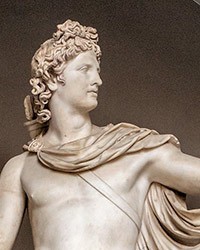
Apollo Belvedere – the greatest work of art from among all the works of antiquity
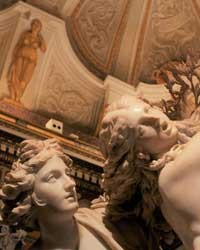
Benrnini’s Apollo and Daphne – a rock animated by love
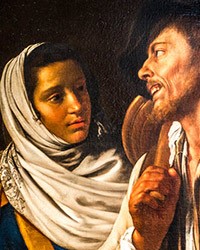
Simon Vouet’s Buona Ventura – the lamentable effects of palm reading
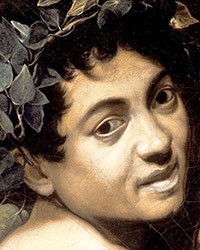
Caravaggio’s Young Sick Bacchus – an artist in the guise or perhaps something much more?

Raphael’s Woman with a Unicorn - an image of a virgin marked by virtue
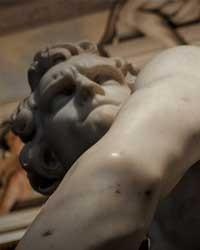
Bernini’s David – a sculpture testifying to the power of faith and humility
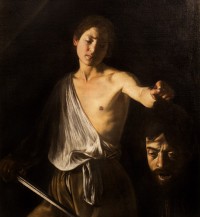
Dawid z głową Goliata – przejmujące wołanie o pomoc boskich i ziemskich sił
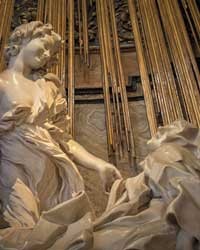
Bernini’s The Ecstasy of St. Teresa – an anthem on the subject of bodily union with God
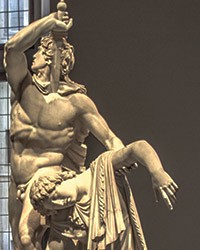
Gaul Killing Himself and his Wife – meaning, praise of an honorable suicidal death
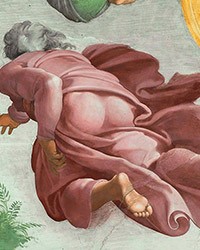
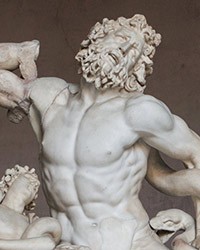
Laocoön Group – the dramatic story of one arm and its lack
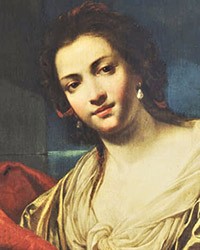
Simon Vouet’s Herodias with the Head of St. John the Baptist – femme fatale of the Baroque
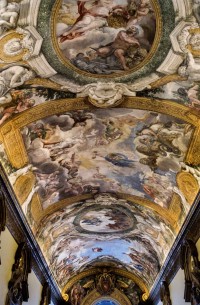
Pietro da Cortona’s The Story of Aeneas – meaning where the pope searched for his roots
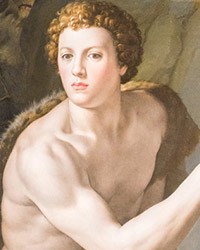
Bronzino’s John the Baptist – between cold eroticism and refined devotion
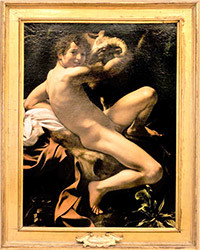
Caravaggio’s St. John the Baptist – a work of art, sacrilege, or child pornography?

Caravaggio’s Judith and Holofernes – a refined mixture of violence and desire
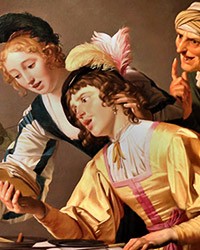
Van Honthorst’s The Concert – singing together or perhaps a peregrination of the prodigal son?

The Temptation of St. Francis – a lesson in the taming of the senses
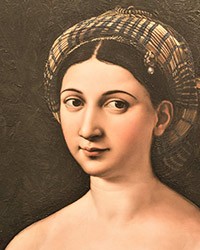
Raphael’s Fornarina – a mysterious love interest or perhaps…
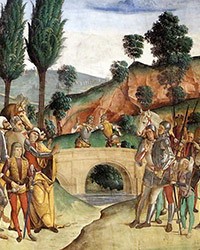
Antoniazzo Romano’s Legend of the True Cross – miraculousness told in a Renaissance way
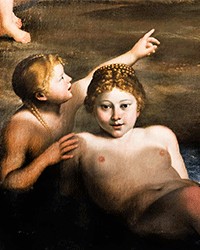
Domenichino’s The Hunt of Diana – a painting about spying and its unfortunate results
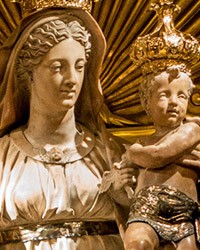
Jacopo Sansovino’s Madonna del Parto – between a saint and a maid
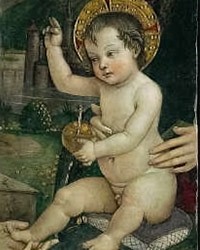
Madonna delle mani – an indecent work, damaged and found anew
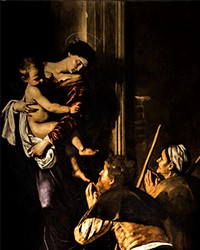
Caravaggio’s Madonna of Loreto - the sanctity of dirty, coarse feet
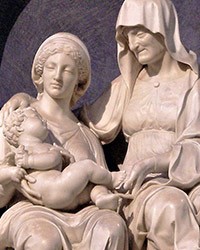
Andrea Sansovino’s Madonna and Child with St. Anne – a work praised by poets
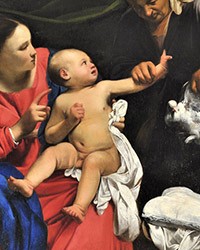
Carlo Saraceni’s Madonna and Child with St. Anne – an everyday life scene and… a dove
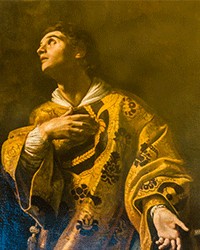
Giovanni Lanfranco’s Apparition of the Virgin to St. Lawrence – a thematic painting yet not bereft of artistry
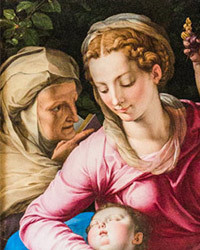
Bronzino’s Madonna with Child, St. John the Baptist and St. Anne – meaning a song of love sentenced to suffering
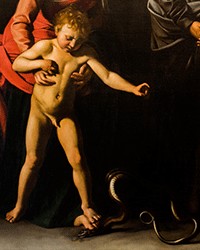
Caravaggio’s Madonna and Child with St. Anne – a work despite and against itself
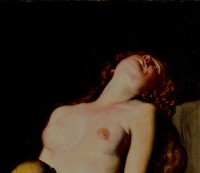
Magdalene Fainting – a bold act (between mystical rapture and sexual ecstasy
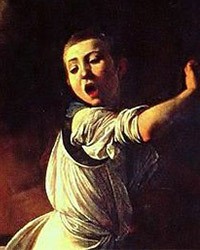
Caravaggio’s The Martyrdom of St. Matthew – death among onlookers and terrified passersby
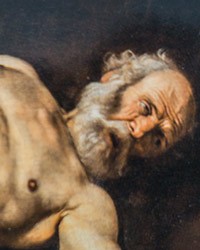
Caravaggio’s The Crucifixion of St. Peter – a painting on the banality of evil
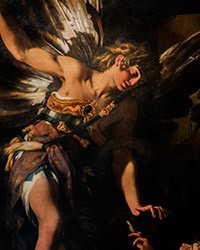
Giovanni Baglioni’s Heavenly Love and Earthly Love – a virtue in the struggle against sin
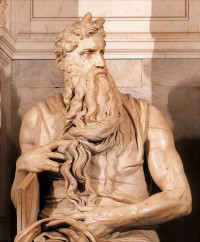
Michelangelo’s Moses – the remains of a tragic work
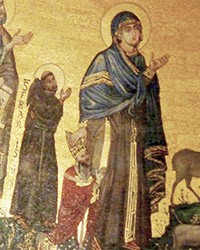
Mozaiki w absydzie bazyliki San Giovanni in Laterano – czyli jak wygląda niebo
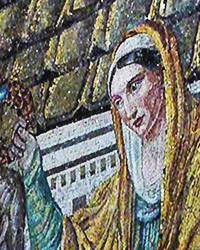
Mosaics in the Church of Santa Pudenziana – how the Good Shepherd became a lawgiver
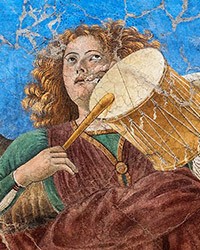
Melozzo da Forlì’s Musical angels – Christ among songs, music and dance

Nadzy herosi czy bezskrzydli aniołowie – zagadkowi młodzieńcy ze sklepienia Kaplicy Sykstyńskiej
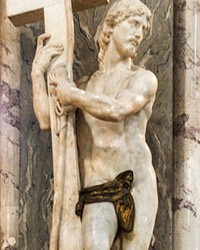
Michelangelo’s Nude Christ – miraculously duplicated
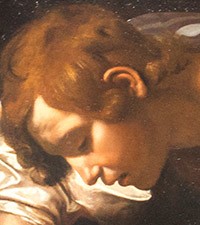
Caravaggio’s Narcissus at the Source – a tragedy of unfulfilled love, or perhaps a story about the essence of art
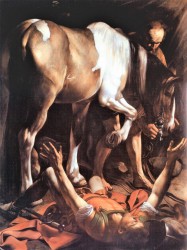
Caravaggio’s Conversion of St. Paul – meaning how Saul became Paul
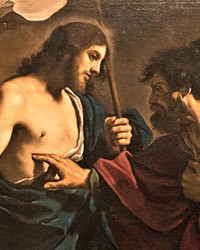
The Incredulity of St. Thomas– and how strong is your faith?

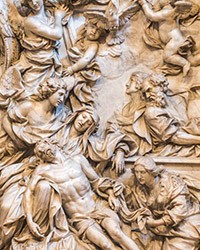
Domenico Guidi’s The Lamentation – dramatic pathos, a throng of people, and movement
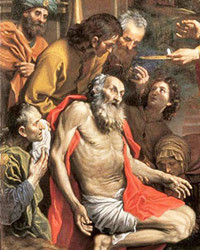
Domenichino’s The Last Communion of St. Jerome – a work about the superiority of communion under one kind
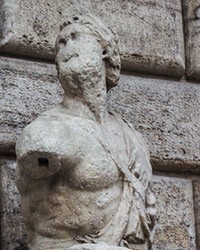
Pasquino – snide, mean and still today irreplaceable
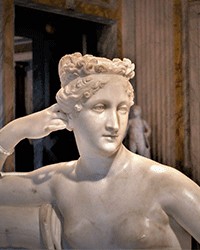
Antonio Canova’s Pauline Borghese as the Venus Victrix – remember me like this for ages
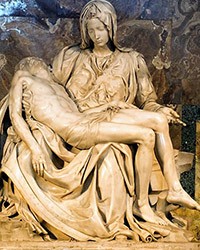
Michelangelo’s Pietà – an astonishing story of silent suffering
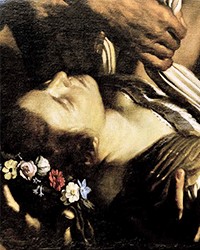
Guercino’s The Funeral of St. Petronilla – a difficult topic, masterfully solved

Pokutująca Maria Magdalena Charlesa Mellina – między atrakcyjnym mitem a nagą prawdą
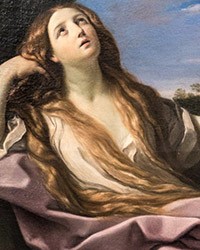
Guido Reni’s The Penitent Magdalene – between sinful charm and heavenly vision
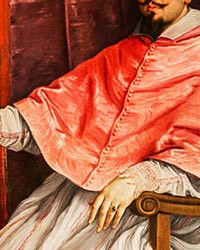
Portrait of Cardinal Bernardino Spada – a diligent, hard-working, and prudent official
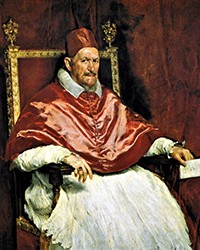
Velázquez’s Portrait of Pope Innocent X – a real, perceptive and effective portrait
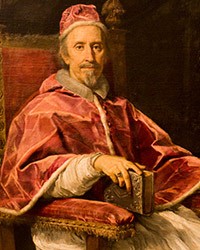
Portrait of Pope Clement IX – a subtle image of a delicate pontifex

Bronzino’s Portrait of Stefano Colonna – a picture-perfect condottiero
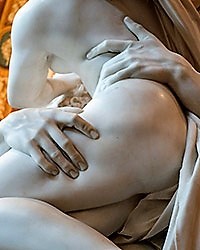
Gian Lorenzo Bernini’s The Rape of Proserpina, meaning sanctioned rape
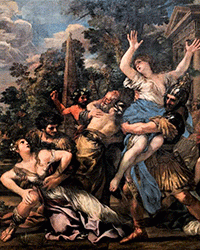
Pietro da Cortona’s Rape of the Sabine Women – all is well that ends well
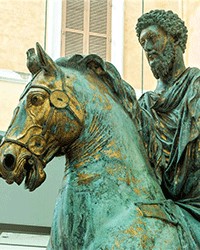
Equestrian Statue of Marcus Aurelius – a symbol of imperial harmony and peace
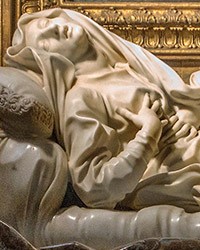
Ludovica Albertoni – a masterpiece in the shadow of a moral scandal

Bernini’s Statue of St. Bibiana – meaning how to present a virgin in the moment of bliss
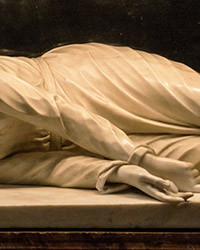
Stefano Maderno’s Lying St. Cecilia – a miracle or an elaborate mystification?
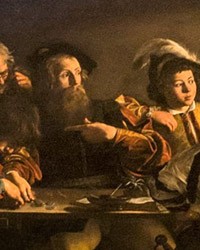
Caravaggio’s The Calling of St. Matthew – how a sinner becomes the chosen of God
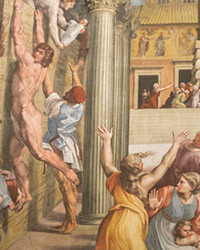
Raphael’s Fire in the Borgo – a hymn on the subject of more than just antiquity
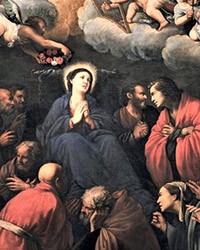
Carlo Saraceni’s Transitus Mariae – meaning how the Discalced Carmelites co-created the image of the Most Holy Virgin
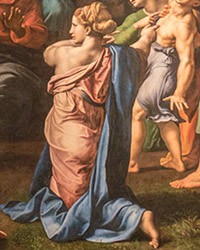
The Transfiguration – the most divine of all Raphael’s works
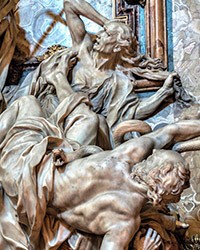
The Triumph of Religion Over Heresy by Pierre Le Gros – meaning a Jesuit theatrum sacrum
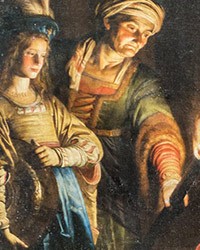
Van Honthorst’s The Beheading of St. John the Baptist – a work immersed in darkness
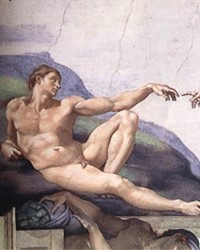
Michelangelo’s Vault of the Sistine Chapel – a masterpiece born out of doubt and suffering
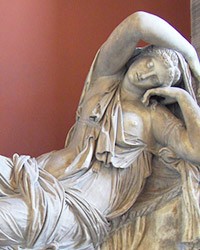
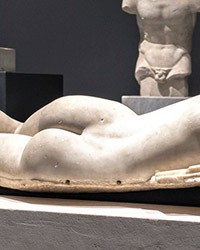
Sleeping Hermaphrodite – the ever-present third gender
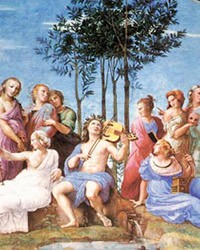
Raphael’s Stanzas – meaning how the popes had wanted to live
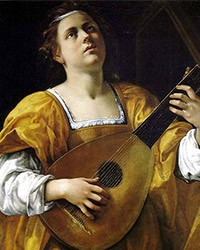
Artemisia Gentileschi’s Saint Cecilia Playing the Lute – an autoportrait in the guise of a saint
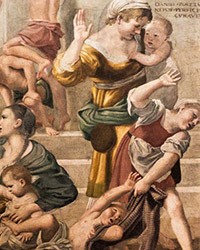
Saint Cecilia Distributing Alms to the Poor– a story of the recalcitrant Roman populace
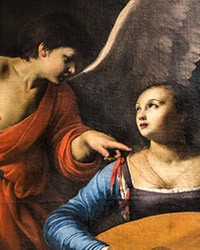
Carlo Saraceni’s St. Cecilia with an Angel - two musicians
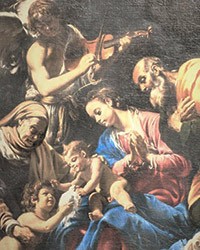
The Holy Family with St. Elizabeth, the Young St. John the Baptist, and an Angel – a family meeting with an angel in the background
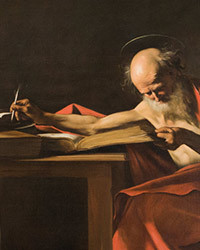
Caravaggio’s Saint Jerome – the Doctor of the Church as a weapon in the struggle against heretics
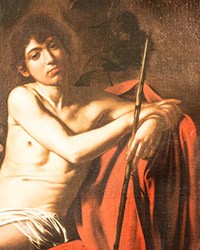
Święty Jan Chrzciciel Caravaggia – znużony efeb czy melancholijny święty?
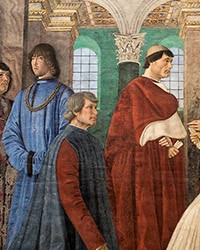
Melozzo da Forlì’s Sixtus IV Appointing Platina as Prefect of the Vatican Library – pope as an earthly ruler and a patron of science
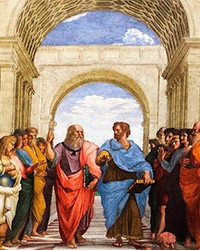
Raphael’s’ The School of Athens– a fancy riddle or an alternative history
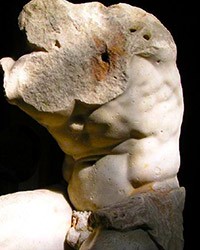
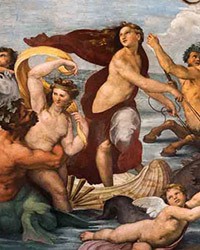
Raphael’s Triumph of Galatea – beauty and the beast in a Renaissance version
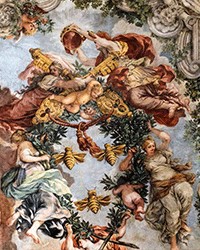
Pietro da Cortona’s Triumph of Divine Providence – family apotheosis, meaning painting to the point of breathlessness

Ukrzyżowanie świętego Piotra – męczeństwo jako akt wypełnienia się woli Bożej
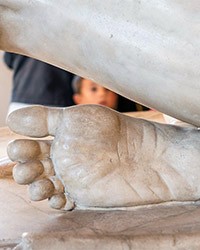
Dying Gaul – a funeral rhapsody in memory of the Gauls
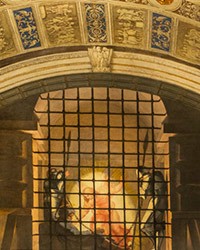
The Deliverance of St. Peter– between reality and a vision
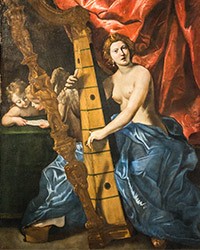
Giovanni Lanfranco’s Venus Playing the Harp – a tribute to music or perhaps to love?

Wenus Knidyjska – wizerunek skromnej, zawstydzonej hetery

Crouching Venus – eavesdropped on for the last two thousand years
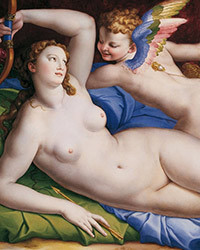
Bronzino’s Venus, Cupid, and Satyr – a sublime allegory or a courtly jest?
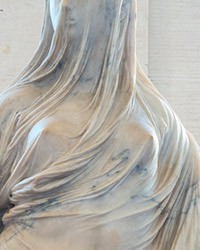
The Vestal Virgin Tuccia – between virtue and downfall, meaning the story of an unwanted work
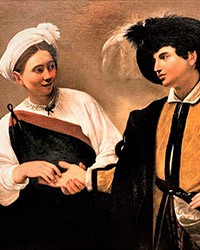
Caravaggio’s Fortune Teller – a painting about the dangers of life and the illusion of art
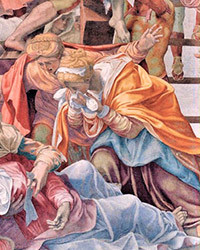
Daniele da Volterra’s The Descent from the Cross – a faded shadow of a great work, meaning the aftermath of vandalism
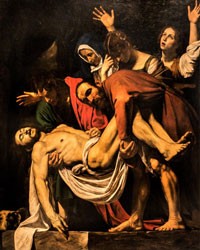
Caravaggio’s The Entombment of Christ – a perfect work
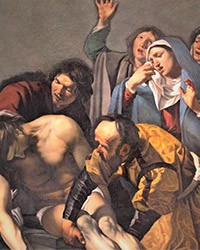
Dirck van Baburen’s The Entombment of Christ – catching up with Caravaggio
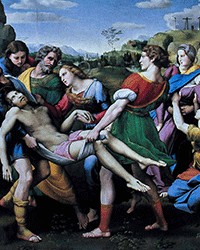
Raphael’s The Deposition – a painting of suffering, the fragility of life and an unforgettable loss
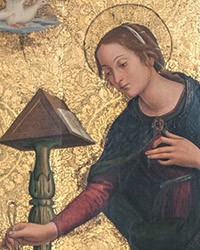
Antoniazzo Romano’s Annunciation – meaning, how the Virgin Mary can miss the most important moment of her life
Zgodnie z art. 13 ust. 1 i ust. 2 rozporządzenia Parlamentu Europejskiego i Rady (UE) 2016/679 z 27 kwietnia 2016 r. w sprawie ochrony osób fizycznych w związku z przetwarzaniem danych osobowych i w sprawie swobodnego przepływu takich danych oraz uchylenia dyrektywy 95/46/WE (RODO), informujemy, że Administratorem Pani/Pana danych osobowych jest firma: Econ-sk GmbH, Billbrookdeich 103, 22113 Hamburg, Niemcy
Przetwarzanie Pani/Pana danych osobowych będzie się odbywać na podstawie art. 6 RODO i w celu marketingowym Administrator powołuje się na prawnie uzasadniony interes, którym jest zbieranie danych statystycznych i analizowanie ruchu na stronie internetowej. Podanie danych osobowych na stronie internetowej http://roma-nonpertutti.com/ jest dobrowolne.